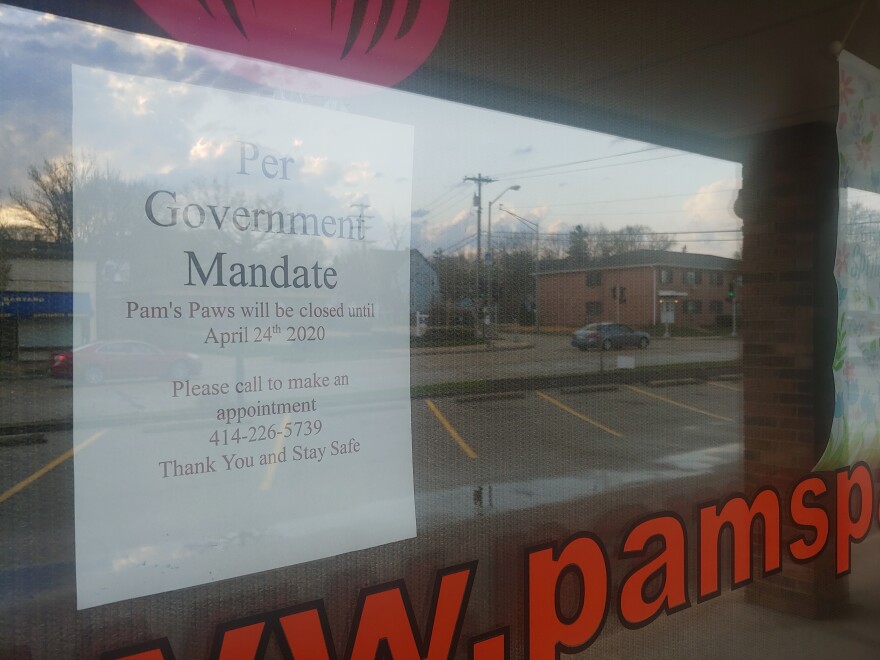Wisconsin Gov. Tony Evers has relaxed more restrictions on what the state calls nonessential businesses. But medical experts say it'll be a long time before businesses and customers see things returning to a pre-COVID-19 normal.
Evers announced Monday that starting Wednesday, businesses can allow curbside drop-off of goods and animals. That will allow dog groomers, engine repair shops and upholstery businesses to open or do more business. Evers also says it's now OK to rent outdoor recreational vehicles like boats, golf carts and kayaks. Plus, automatic car washes can operate.
>>The Latest WUWM & NPR Coronavirus Coverage
Business groups and Republican legislators are pressuring the Democratic governor to make bigger changes to his recently announced plan to keep the state's safer-at-home restrictions on until at least May 26. But Evers says the latest modifications are modest and justified.
"We believe these activities that we talked about are kind of one-off issues, like a single person/single consumer interacting with a single provider of services. Let's say it's somebody renting a kayak. It seems that we are able to do this in a way that's safe, has to happen outside the business. Clearly, social distancing has to be there,” Evers told reporters during a briefing.
Evers' announcement is triggering a positive reaction from some Wisconsin business leaders. Tim Sheehy of the Metropolitan Milwaukee Association of Commerce says it's progress.
"I think it’s a measured way we can continue to build confidence in employees and the consumer will help that dial move faster. So, a move in the right direction, and we want to see more of it,” Sheehy said.

The leader of Wisconsin Economic Development Corporation says her agency is working on ways to help other businesses get ready to eventually open. Missy Hughes told the Greater Milwaukee Committee that she hopes her agency will become a hub of information.
''For businesses that are trying to understand what do I need to change: Do I need to have PPE [personal protective equipment]? Do I need to put up Plexiglas? Like all these changes that are really challenging," she said.
Whether it's making sure enough employees are wearing PPE like masks and gloves or taking other safety precautions, Hughes says businesses and consumers are going to have to be able to trust each other.
"If you're a customer walking into a business, and you're not feeling all that well that day, that's not fair to that business, that's not fair to that worker in that business. At the same time, if you're a consumer walking into a business, you should expect that that business has done what needs to be done to protect you,” Hughes said.
Some firms have already made changes. Janesville company Monterey Mills recently shifted its production from paint roller fabric and blankets to washable, reusable face masks. President and CEO Dan Sinykin says staying open has meant new policies.
"We started staggering breaks and lunchtimes immediately. We're only allowing one employee per table in our lunchroom. We're cleaning the lunchroom over and over again throughout the day, as well as areas of the factory people touch multiple times. We moved to touchless time clocks and moved to swipe cards instead of manually entering codes," Sinykin said.
Sinykin says every employee is provided a laundered mask every day. Every worker gets a temperature test and is paid to stay home if sick. And Sinykin knows well the dangers of COVID-19: He says, he, his wife and their four children all fought through the disease last month.
Statewide, there are now more than 6,000 confirmed cases of COVID-19 and more than 280 people have died. Medical College of Wisconsin president and CEO John Raymond says even as more businesses reopen and take precautions, they should also realize coronaviruses don't easily disappear in a connected world.
"So, unless there is a very significant extinguishing of the virus either by a vaccine or herd immunity, it's very likely to come back,” Raymond said.
During this pandemic, WUWM's Bubbler Talk is focusing on the coronavirus and its impact on the Milwaukee area. If you have a question, submit it below.
_




